We believe shared experiences and education make us better investors and partners. Every six months, the entire firm reads one book together and meets to discuss it. These books are listed below:
Cornerstone’s Bookshelf
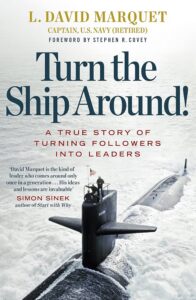
1H 2025: "Turn the Ship Around!" by L. David Marquet
In Turn the Ship Around, L. David Marquet shares his success in implementing an innovative “leader-leader” approach aboard the submarine USS Santa Fe that empowered crew members at all levels to take initiative and make decisions. Marquet outlines practical techniques for distributing power and encouraging proactive decision-making among teams. We enjoyed learning how his leadership philosophy boosted operational performance, crew morale, and leadership development across levels in an organization.
2H 2024: "The Culture Code" by Daniel Coyle
Daniel Coyle’s The Culture Code delves into the secrets of creating successful group dynamics by examining high-performing teams and organizations. It highlights the importance of (1) fostering safety, (2) sharing vulnerability, and (3) establishing purpose, to cultivate strong, cohesive cultures. We were particularly interested in the “Ideas for Action” at the end of each section, and how we can strengthen these aspects within Cornerstone’s own culture.
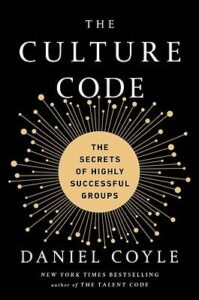
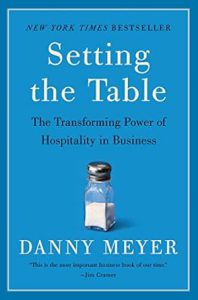
1H 2024: "Setting the Table" by Danny Meyer
Cornerstone’s mission is the combination of excellence in investing and client service. Danny Meyer’s (Gramercy Tavern, Union Square Café, Shake Shack) bible on hospitality helped us explore how to apply lessons from the restaurant business to the investment space. We were particularly focused on understanding the importance of hospitality versus service, identifying the excellence reflex and those emotional skills underlying it, and implementing this approach throughout our organization.
2H 2023: "Think Again" by Adam Grant
Adam Grant, who was a business school professor of multiple partners at Cornerstone, discusses the power of nimble thinking. In an industry where getting it right 60% of the time represents success, it is important to constantly re-assess our positions and perspectives in the face of updated evidence, and the failure to do so could lead to significantly worse outcomes. It also helped us re-focus on the power of internal constructive engagement among our teams to refine our thinking on a topic.
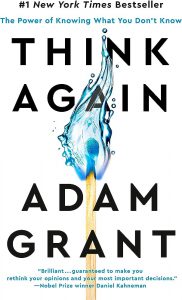
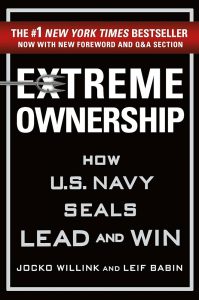
1H 2023: "Extreme Ownership" by Jocko Willink and Leif Babin
Given the potential consequences of their actions for themselves and others, Navy Seals focus intently on pro-active and re-active decision-making. This book explores the importance of taking ownership and responsibility over one’s actions, both before and after they occur. Using case studies from real combat situations and key frameworks, it helped us understand ways we can better manage our decision-making processes and assess the outcomes of them, both as a team and individuals.
2H 2022: "Thinking in Bets" by Annie Duke
As investors, we recognize that the market is a complex adaptive system with constantly changing information, and we can never make a decision with 100% certainty. This book, by a professional poker player and Penn psychology Ph.D., focuses on decision-making under that uncertainty. Duke’s concept of “thinking in bets” helped us focus on the inherent split between the skill-driven decisions we make (which we can control) and the luck-driven outcome of those decisions (which we can’t control).
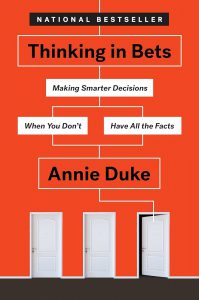
Below is a (not even close to exhaustive) list of books about investing, business, and firm culture that Cornerstone team members have found helpful throughout our careers.
Investing
- Capital Returns – Edward Chancellor
Capital Returns argues that the key to investing success is finding businesses with strong competitive advantages that can deploy capital at high rates of return over long periods of time. It provides a framework for identifying these exceptional businesses by analyzing factors like industry structure, management talent, reinvestment opportunities, and the potential for disruption.
- McKinsey Valuation – Tom Copeland
This staple of undergraduate finance education provides a comprehensive framework for corporate valuation, covering all major valuation techniques like discounted cash flow analysis, multiples, and asset-based approaches. It explains in detail how to estimate key inputs like cost of capital, growth, cash flow projections, and terminal value while addressing complex issues like non-operating assets and liabilities, employee options, and valuing flexibility.
- Damodaran on Valuation – Aswath Damodaran
Aswath Damodaran is a Professor at the NYU Stern School of Business and is known as the Dean of Valuation. Damodaran emphasizes using fundamental data rather than pricing models alone, considering both quantitative methods and qualitative information when valuing companies.
- Thinking in Bets – Annie Duke
Thinking in Bets argues that we should approach life’s decisions like a poker player, by recognizing the inherent uncertainty involved and focusing not just on the quality of our decisions but also on how we evaluate and learn from the outcomes. It provides strategies for embracing complexity, updating beliefs with new information, and avoiding resultant emotional biases that can lead to poor future decisions.
- Common Stocks and Uncommon Profits – Phil Fisher
Common Stocks and Uncommon Profits outlines Fisher’s philosophy of investing in companies with strong fundamentals, competent management, and potential for long-term growth rather than simply looking at current metrics. It advocates doing extensive research to deeply understand a company’s products, people, and competitive position before making an investment commitment to outstanding companies at a reasonable price.
- The Art of Execution – Lee Freeman-Shor
Freeman-Shor studies the performance of investment portfolio managers and identifies traits possessed the most and least successful PMs. The book serves as a helpful tool for investment analysts making the move to portfolio manager.
- The Intelligent Investor – Ben Graham
The Intelligent Investor lays out Graham’s philosophy of “value investing”, which involves analyzing a company’s financials, estimating its true value, and resisting emotional trading to capitalize on market mispricing of securities. The book encourages investors to develop a sound, disciplined long-term strategy, diversify broadly, minimize fees and costs, and protect themselves against substantial errors and permanent loss of capital.
- Richer Wiser Happier – William Green
Green’s book draws investing wisdom from the lives and philosophies of world-class investors and thinkers like Sir John Templeton, Jack Bogle, and Charlie Munger. It emphasizes developing patience, emotional intelligence, humility and rationality to make better financial and life decisions for a life of lasting value beyond just wealth accumulation.
- Competition Demystified – Bruce Greenwald
Greenwald provides a framework called “value discipline” for analyzing competition and industry dynamics based on factors like economies of scale, capacity constraints, and the degree of commodity-like behavior in an industry. It aims to help investors identify sustainable competitive advantages that allow superior profitability over the long run.
- 7 Powers – Hamilton Helmer
7 Powers outlines seven major sources of competitive advantage that businesses can leverage. It provides a framework for analyzing how companies can exploit these seven powers to create and sustain an edge over rivals in their industry.
- Why You Win or Lose – Fred Kelly
“Why You Win or Lose” delves into the psychology behind success and failure, examining the critical role of mindset, strategy, and adaptability in achieving goals. Through compelling anecdotes and psychological principles, Kelly uncovers the underlying factors that determine outcomes, empowering readers to leverage their strengths and navigate challenges effectively in both personal and professional pursuits.
- Buffett – Roger Lowenstein
This biography chronicles how Warren Buffett went from being a young investor and student of Benjamin Graham to building Berkshire Hathaway into a multi-billion dollar conglomerate through his contrarian value investing approach and uncommon business principles. It provides insights into Buffett’s investing philosophy, decision-making process, major deals and missteps over the decades of his legendary career.
- The Power Law – Sebastian Mallaby
The Power Law examines how the fundamental organizing principle of venture capital – making high-risk investments across a portfolio of startups in the hopes that one or two become blockbuster successes that more than compensate for the failures – has had an outsized impact across many sectors beyond tech. It argues that this “power law” approach of betting big on the extreme tail rather than pursuing incremental progress is the key innovation engine of the modern economy.
- The Most Important Thing – Howard Marks
The Most Important Thing emphasizes the importance of second-level thinking – going beyond surface-level analysis to properly understand the bigger picture and develop a contrarian mindset that challenges conventional wisdom. It covers investing principles like risk management, being patient, having a sense for value, and taking advantage of cycles and volatility to make superior investment decisions.
- Am I Being Too Subtle – Sam Zell
Zell’s autobiography chronicles the unconventional business philosophies and blunt negotiation style that allowed Sam Zell to build a multi-billion dollar corporate empire across diverse industries like real estate, energy, and communications. It provides Zell’s candid perspectives on taking calculated risks, managing corporate cultures, dealing with crises, and always striving to be a progressive contrarian thinker.
Business
- Built from Scratch – Arthur Blank and Bernie Marcus
Built from Scratch chronicles how Bernie Marcus, Arthur Blank, and their partners revolutionized the home improvement retail industry by creating a warehouse-style hardware store focused on excellent customer service, a wide product selection, and lower prices. It provides an inside look at the entrepreneurial vision, company culture, and business strategies that allowed Home Depot to rapidly expand across the U.S. and forever change how homeowners shop for tools, appliances and building supplies.
- No Rules Rules – Reed Hastings
No Rules Rules outlines the unique and counterintuitive cultural principles like avoiding rules and allowing unlimited vacation that have fueled Netflix’s disruptive innovation and organizational agility in the video streaming market. It provides insights from Netflix leaders on fostering a high-performance, feedback-driven culture of freedom and responsibility that attracts and empowers top talent to drive continuous reinvention.
- Doing What Matters – Jim Kilts
“Doing What Matters” provides practical insights and strategies for effective leadership, emphasizing the importance of prioritization, accountability, and execution in achieving business success. Through real-world examples and actionable advice, Kilts, the former CEO of Gillette and General Foods, demonstrates how focusing on what truly matters can drive organizational growth and excellence.
- Shoe Dog – Phil Knight
Shoe Dog is a candid account of how Phil Knight’s crazy idea of importing low-cost Japanese athletic shoes and selling them in the U.S. eventually grew into the global Nike brand through perseverance, creative branding, taking calculated risks, and Knight’s unwavering belief in the company’s mission. It provides an inside look at Nike’s early struggles, legal battles, intense rivalry with Adidas, game-changing business moves, and the brilliant but abrasive former executives like Bill Bowerman who helped shape Nike’s innovative culture.
- Cable Cowboy – Mark Robichaux
Cable Cowboy chronicles the life and career of John Malone, one of the most influential figures in the cable television industry, detailing how his unconventional business strategies and dealmaking acumen allowed him to build Tele-Communications Inc. (TCI) into a massive cable empire before departing to lead Liberty Media. It provides an inside look at Malone’s daring moves like his hostile takeover of Qwest, clashes with regulators, and pioneering efforts to expand cable’s reach through programming investments and vertical integration.
- What it Takes – Stephen Schwarzman
This book provides an inside account of how Steve Schwarzman and Pete Peterson founded The Blackstone Group, building it from a struggling boutique M&A advisory firm in the 1980s into one of the world’s largest and most powerful private equity firms that pioneered the leveraged buyout model. It details the firm’s landmark deals like Celanese and Nalco, its aggressive expansion into real estate and hedge funds, and the partnerships and personalities like David Rubenstein that drove Blackstone’s meteoric rise.
- The Everything Store – Brad Stone
This book traces Amazon’s journey from an online bookstore launched out of Jeff Bezos’ garage to becoming one of the world’s most disruptive companies that has transformed e-commerce, cloud computing, logistics, and multiple other industries. It provides an in-depth look at Amazon’s innovative business strategies, its data-driven corporate culture shaped by Bezos’ relentless ambition and customer obsession, and its willingness to prioritize long-term thinking over short-term profits.
- The Outsiders – William Thorndike
“The Outsiders” explores the unconventional strategies of eight successful CEOs who prioritized capital allocation to drive long-term value for their companies and shareholders. Through insightful case studies and analysis, Thorndike reveals the importance of independent thinking and disciplined decision-making in corporate leadership, challenging traditional business norms.
- Made in America – Sam Walton
Made in America chronicles how Sam Walton went from running a single dime store to creating the world’s largest retailer by revolutionizing supply chain management, insisting on rock-bottom prices, and concentrating Walmart’s growth in rural and small-town America before expanding nationwide. It offers insights into Walton’s core business philosophies around frugality, customer service, motivating employees, and continuously driving for greater efficiency and cost savings.
Culture
- The Culture Code – Daniel Coyle
Daniel Coyle’s The Culture Code delves into the secrets of creating successful group dynamics by examining high-performing teams and organizations. It highlights the importance of (1) fostering safety, (2) sharing vulnerability, and (3) establishing purpose, to cultivate strong, cohesive cultures.
- Think Again – Adam Grant
In this thought-provoking book, Adam Grant explores the benefits of rethinking our opinions and unlearning outdated knowledge and biases in order to make better decisions and achieve greater success. Grant provides strategies for embracing an open and curious mindset, humbling ourselves, and updating our beliefs based on new information – valuable skills in our rapidly changing world.
- Setting the Table – Danny Meyer
Renowned restaurateur Danny Meyer shares his philosophy and insights on providing exceptional hospitality, both in his restaurants and in business more broadly. He emphasizes the importance of putting employees and customers first, delivering great service through empathy and attention to detail, and creating an outstanding culture that ensures consistent excellence.
- High Altitude Leadership – Chris Warner and Don Schminke
High Altitude Leadership uses the metaphor of mountain climbing to provide a framework for effective leadership, emphasizing the importance of preparation, teamwork, and resilience in overcoming obstacles on the journey toward achieving challenging goals. Through real-world examples and practical advice, it teaches leaders how to inspire and guide their teams to scale new heights of performance and success. One of our Partners, Justin Scott, has climbed with Chris in South America.
- Extreme Ownership – Jocko Willink and Leif Babin
Extreme Ownership draws on the authors’ experience as U.S. Navy SEALs to outline principles of leadership that involve taking complete responsibility for everything in your world, including the actions of your team. By owning every mistake and every moment of bad luck or misfortune, leaders can learn from failure, retain authority, and continue leading effectively.
In an effort to understand AI applications better, we used AI tools to write the above summaries.
